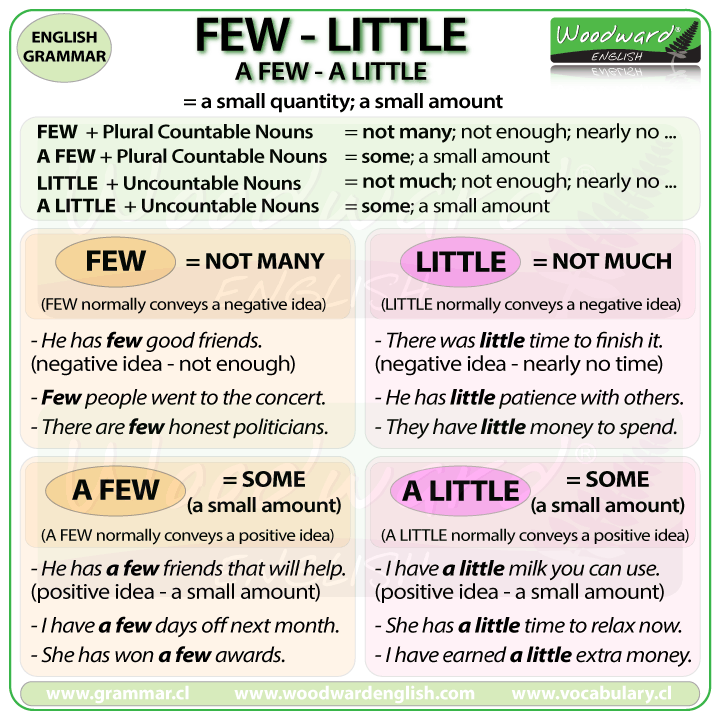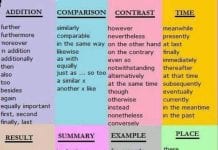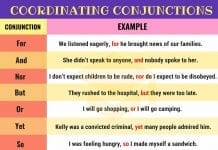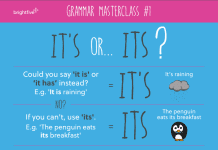
- I have a little money left, so we can go shopping if you want.
- I have little money left, so I don’t think I can go shopping.
- I have a few dollars left, so we can go shopping if you want.
- I have very few dollars left, so I don’t think I can go shopping.
The phrases A LITTLE, LITTLE, A FEW AND FEW seem to mean similar things at first, but as you can see from the example sentences above, you have to be careful about when to use each one.
They’re grammatically considered determiners in that they modify nouns similar to the way words like THE or A(N) do. Let’s break down how each of these four determiners differ below.
1. USE A LITTLE WITH UNCOUNTABLE NOUNS TO MEAN SOME
First off, what exactly is an uncountable noun? An uncountable noun is a specific type of noun in English that, simply, cannot be counted and does not have a plural form.
For example, take the noun rain. You can say that there is a lot of rain or that there is a little rain, but you can’t say that there are two rains or three rains. That’s what makes the noun rain uncountable.
You could say that there are two raindrops or three raindrops, but that’s a different noun entirely. Other uncountable nouns include words like water, bread, money, happiness, etc.
Let’s go back to our original sentence for a little:
- I have a little money left, so we can go shopping if you want.
Here, we use the determiner a little instead of a few because MONEY is an uncountable noun. It wouldn’t sound right to say that you have a few money or a few moneys.
However, we should also be careful about what a little means exactly. It does mean a small amount, but not in a negative way. In other words, it does not emphasize smallness or a lack of something.
It’s simply a neutral way of saying that you have some of something. Not a lot, not too little. This is why if you say that you have a little money, you probably still have enough to do some spending.
Here are some more example sentences using the determiner a little.
- I usually have a little time between classes to go grab a snack.
- There’s still a little snow outside that hasn’t melted from the winter.
- “Is there still juice in the fridge?” “There’s a little left if you want to have some.”
You can also use the phrase a little bit of, which means the same thing as a little.
- I’ll have a little bit of pizza, but not too much.
- My mom always puts a little bit of salt to her recipes. She says it makes the flavors stand out more.
List of Words Without Plural Form (Uncountable Nouns)
Countable and Uncountable Nouns Examples
Difference between British and American Uncountable Nouns
Some – Any – A – An
2. USE LITTLE WITH UNCOUNTABLE NOUNS TO MEAN NOT MUCH
The determiner little is also used with uncountable nouns. Its meaning, however, is different from the determiner a little. While a little is a neutral way of indicating a small amount of something, saying little emphasizes that the amount is lacking somehow – that it is not enough. It’s another way of saying, in other words, not much.
Back to one of our example sentences:
- I have little money left, so I don’t think I can go shopping.
Here, the speaker is saying that they don’t have much money, which is very different from saying, “I have a little money left.” This small word, a, really makes the difference in meaning! And once again, the determiner little should only be used for uncountable nouns. You cannot say few money or few moneys without sounding strange.
Here are some more example sentences using the determiner little:
- The workers had little incentive to reach the weekly quota.
- I have little time to do anything for pleasure these days.
- He used to live with relatively little stress, until he got married, that is.
It’s also common to pair up little with words like very, such, or so. For example:
- The doctor says that the surgery will cause very little pain.
- There was such little enthusiasm in the crowd that the comedian decided to stop his act early.
- There was so little room in the car I could barely breathe.
3. USE A FEW WITH COUNTABLE NOUNS TO MEAN SOME
The determiner a few means essentially the same thing as a little, except it can only be used with countable nouns. We’ve already seen examples of uncountable nouns (e.g. rain, bread, money).
Countable nouns, meanwhile, are the conventional nouns that most people think of – they can be counted and come with plural forms, usually by adding the letter “s.”
Let’s look at one of the earlier examples:
- I have a few dollars left, so we can go shopping if you want.
The reason we use a few here instead of a little is that dollars, unlike the word money, is a countable noun. So, whenever you’re dealing with nouns that have a plural form, make sure to use a few instead of a little. For example:
- If you have any questions, I might be able to give you a few answers.
- The man gave me a few looks before he decided to approach me. I quickly slipped into the bathroom.
- I can think of a few embarrassing moments in my life off the top of my head, but I’m not going to tell you any.
There are many other determiners that mean about the same thing as a few. These include a couple, several and some. For example:
- If you have any questions, I might be able to give you some answers.
- The man gave me a couple looks before he decided to approach me.
- I can think of several embarrassing moments in my life off the top of my head.
However, people often debate the exact number that each determiner denotes. For instance, some might say that a couple strictly means “two,” while others might consider it to mean “two or three.” Generally, several is considered to be more than “a few,” and the word “some” simply means a small amount.
A colloquial expression that you may sometimes here is quite a few, which, ironically, means a lot or a great amount. For example:
- I saw my friend down quite a few beers before finally passing out for the night.
- There were quite a few cars on the road today, making my commute a bit longer than usual.
4. USE FEW WITH COUNTABLE NOUNS TO MEAN NOT MANY
Remember the difference between “a little” and “little”? The same thing applies to “a few” and “few.” While “a few” is a neutral term to signify a small amount of something, the determiner few specifically means not many, such as in our previous example sentence:
- I have very few dollars left, so I don’t think I can go shopping.
The word “very” was added before few to make the sentence more natural, but you can see that when the word “few” is used without the extra a, the connotation is that the amount is lacking.
The word few, unlike “little,” is not commonly used alone as a determiner. Thus, here are some examples using the phrases very few, such few, and so few, which sound more natural in spoken English.
- I feel like men have such few options when it comes to fashion.
- We have very few books on the subject of Zen Buddhism.
- He made so few mistakes on his test that he was recruited to become a TA* for the next semester.
* TA is an abbreviation for teacher’s assistant.
5. LITTLE CAN BE USED TO MEAN SMALL
An obvious difference between “little” and “few” is that “little” can be used to describe size, and “few” cannot. This is probably the first meaning of “little” that you’ve learned. For example:
- I went back to my room to see a little note from my mother left on my bed.
- The streets were swamped with little children during the town parade.
6. A LITTLE AND LITTLE CAN ALSO BE ADVERBS
Both “a little” and “little” can also be used to modify verbs, which “a few” and “few” cannot do. For example, let’s look at these two sentences:
- My family likes to talk a little about politics at dinner.
- My family likes to talk little about politics at dinner.
In both sentences, “a little” and “little” become adverbs that modify the verb “to talk.” However, as we have seen previously, these adverbs mean different things. In the first sentence, the family enjoys talking here and there about politics.
But in the second sentence, the family does not like to talk much about politics. Once again, the word “little” without the “a” emphasizes a lack or insufficiency of something.
Meanwhile, the adverb “a little” can be used to modify adjectives, while the same does not apply to “little.” For example:
- Last time I visited the east coast, it was a little chilly. (You cannot say “little chilly”)
- The exhibition was a little interesting, but I would rather have not gone. (You cannot say “little interesting.”)
7. WHEN ELSE DOES A MAKE A DIFFERENCE?
While we have seen that the word “a” can make a big difference in meaning with both “little” and “few,” these seem to be unique cases. In most other cases, the word “a” simply acts as a normal indefinite article. For example:
- My friend and I had a great time in Amsterdam!
- My friend and I had great times in Amsterdam!
In the first sentence, we use the word “a,” while in the second one, we don’t. The reason for this, however, is the changing from singular to plural of the word “time.” It doesn’t have anything to do with the adjective “great.”
Meanwhile, phrases like a lot of or a bunch of do not make sense if you drop the “a.” You can say that you have “lot of cash” or “bunch of friends.” The exception to this is the phrase lots of, but as you can see, this is because the noun “lot” becomes plural, and the article “a” is no longer needed.

























